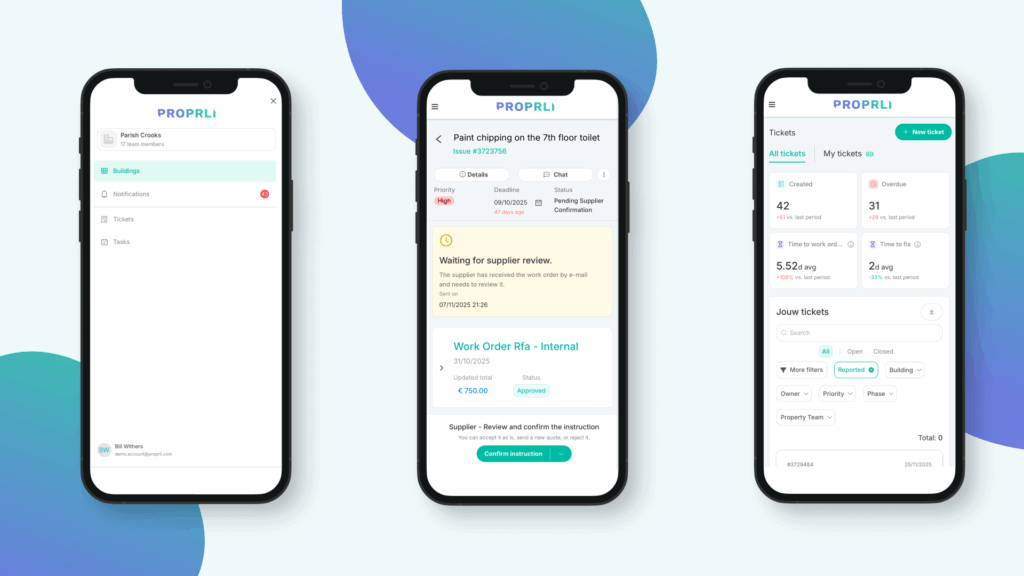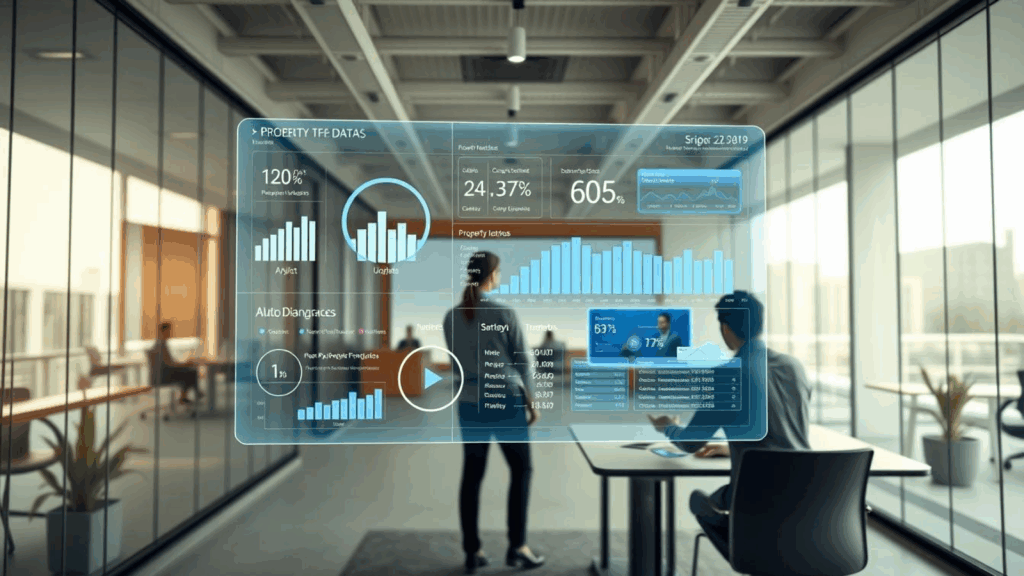Property management is a demanding field that requires balancing tenant needs, owner expectations, and the ongoing challenges of maintenance, leasing, and operations. Technical real estate managers often face unique pressures, such as managing time efficiently, maintaining positive tenant relationships, and staying compliant with evolving regulations.
Industry insights reveal that utilizing technology, such as automated reminders for rent payments, can significantly reduce late payments in a short time frame. These tools not only improve operational efficiency but also streamline processes, enabling property managers to focus on strategic priorities.
Research also emphasizes the importance of tenant relationships, showing that tenants are far more likely to renew leases when managers foster a positive and responsive environment. Modern property management solutions can assist in organizing tasks and ensuring tenant needs are promptly addressed, strengthening these critical relationships.
Additionally, managers who prioritize sustainability through upgrades like energy-efficient lighting or smart building systems report benefits such as quicker lease-ups and higher tenant satisfaction. Leveraging real-time data and analytics within property management software empowers managers to make informed decisions that align with both tenant preferences and market demands.
Key Takeaways
- Property management software automates manual processes, saving time and increasing productivity
- Technology solutions help track properties, receive task alerts, and improve tenant satisfaction
- Automatic payment reminders can significantly reduce late rent rates
- Maintaining positive tenant relationships leads to higher lease renewal rates
- Leveraging real-time data and reporting enables data-driven decision-making aligned with tenant priorities
Time Management and Efficiency
Effective time management is a significant challenge for technical real estate managers. The multitude of tasks can overwhelm and distract from priorities. Property management software offers features to streamline operations and enhance efficiency.
Automated reminders revolutionize payment management and reduce late rent issues. By setting up scheduled notifications, property managers can ensure timely payment reminders. This minimizes the time spent on manual tracking and chasing payments. Rent collection software saves property managers hours, freeing them from repetitive tasks.
Task prioritization is crucial for effective time management. Property management software enables managers to categorize tasks by urgency. This ensures immediate priorities are addressed while maintaining long-term planning. By focusing on high-priority tasks during peak hours and using time-blocking, managers can boost productivity and reduce waste.
| Time Management Strategy | Benefits |
|---|---|
| Automated Reminders | Reduces late rent payments and saves time on manual tracking |
| Task Prioritization | Ensures immediate priorities are addressed while maintaining long-term planning |
| Time-Blocking | Improves productivity by focusing on high-priority tasks during peak concentration hours |
| Outsourcing Administrative Tasks | Helps manage time better and prevents burnout when managing large portfolios |
Delegating administrative tasks and using tools like task managers can streamline operations. Outsourcing non-essential duties allows property managers to focus on core responsibilities. Cloud solutions enable quick data access, enhancing efficiency and productivity.
Property management software also ensures eu compliance by managing data across various property types. This approach simplifies access to critical information, reducing time spent searching for files. Employees spend about 25% of their workweek on such tasks. Implementing smart property management software can save significant time and boost efficiency.
Tenant Communication and Relationship Management
Effective communication and proactive relationship management are crucial for technical real estate managers. They help retain tenants and create a positive living environment. Most modern property management platforms provide tenant portals. It streamlines communication and empowers tenants to access important documents, submit maintenance requests, and set up automatic rent payments.
Multiple communication channels, such as email, chat, and in-app messaging templates, are available. This ensures timely and efficient interactions with tenants. Automated notifications also enhance communication, keeping tenants informed about upcoming events, maintenance reminders, and important updates.
Proactive maintenance management shows a commitment to tenant well-being and satisfaction. Property management software allows tenants to easily submit maintenance requests through the tenant portal. This ensures prompt attention to their concerns. By addressing issues quickly and efficiently, managers can mitigate potential damage and reduce tenant turnover.
Fostering a sense of community is another key aspect of tenant relationship management. Property management software can facilitate the organization of tenant appreciation events, distribution of move-in gifts, and sharing of community updates. These efforts contribute to a positive living experience and increase tenant loyalty.
| Communication Feature | Benefit |
|---|---|
| In-app messaging templates | Effective communication without sharing personal phone numbers |
| Automated notifications | Timely updates on events, maintenance, and important information |
| Multiple communication channels (email, chat) | Enhanced landlord-tenant interactions and accessibility |
| Tenant portal | Access to documents, maintenance requests, and automatic rent payments |
By leveraging modern property management software, technical real estate managers can significantly improve tenant satisfaction and retention. These tools and strategies streamline communication, manage maintenance requests, and foster community building. Investing in them leads to more efficient operations and long-term success in the competitive real estate market.
Maintenance and Repair Management
Effective maintenance and repair management is crucial for technical real estate managers. It ensures tenant satisfaction and maintains property value. Property management software offers tools to streamline work order tracking, vendor management, and maintenance history documentation.
Features like customizable work order forms and automated prioritization help manage maintenance requests efficiently. Managers can track progress in real-time. Software solutions also simplify vendor management by storing contact information and tracking performance.
Comprehensive maintenance history records within the software help identify recurring issues. They enable managers to plan preventive maintenance and make data-driven decisions.
| Benefit | Impact |
|---|---|
| Reduced equipment downtime | 72% decrease |
| Faster work order resolution | 67% reduction in time |
| Improved efficiency | Handle 30% more properties without additional staff |
By leveraging property management software, real estate managers can optimize maintenance workflows. They can extend equipment life and provide prompt service to tenants. Integrating work order tracking, vendor management, and maintenance history in a centralized system enhances operational efficiency and tenant satisfaction.
Financial Management and Reporting
Effective financial management is crucial for technical real estate managers to ensure property profitability and smooth operation. Property management software provides essential tools for streamlining financial processes. These include online payments, financial reporting, and data centralization.
Implementing property management software can significantly improve financial management and reporting for technical real estate managers. By leveraging online payments, comprehensive reporting, and centralized data, managers can optimize their financial processes. This drives profitability.
Compliance and Legal Obligations
Property managers face a daunting task in navigating the intricate world of legal compliance regulations. Property management software emerges as a crucial ally, offering tools to simplify these processes. It aids in automating lease tracking, providing access to legal resources, and facilitating financial reporting. These capabilities empower managers to uphold compliance effectively.
Tenant screening is a vital component of compliance. Property management software enables the establishment of robust screening criteria that meet legal standards while avoiding discrimination. It aids in crafting clear, legally compliant lease agreements. These agreements outline tenant expectations and responsibilities, reducing potential misunderstandings and conflicts.
| Legal Compliance Area | Key Considerations |
|---|---|
| Local Housing Acts | Prevent discrimination and ensure equal housing opportunities |
| Local Property Laws | Understand landlord-tenant relationships, maintenance standards, and eviction procedures |
| Local Ordinances | Comply with zoning laws and local requirements |
| Lease Agreements | Ensure leases adhere to state and local laws and are clear to prevent disputes |
| Safety Standards | Maintain smoke detectors, fire exits, and well-maintained electrical and plumbing systems |
Property managers must stay abreast of legal updates and best practices. Many software platforms offer educational resources, legal updates, and training modules. These tools help managers keep up with laws and regulations. They also provide automated reminders for lease renewals, terminations, and critical dates, ensuring compliance with lease terms and legal timelines.
Financial management is another critical area where legal compliance is essential. Property management software aids in meeting financial reporting requirements, offering automated tools for generating reports. These reports are necessary for tax purposes, audits, and financial reviews. This ensures transparency and adherence to regulations while streamlining the reporting process.
Scalability and Portfolio Growth
Managing an expanding property portfolio can be overwhelming. Yet, by adopting scalable systems and standardizing processes, property managers can efficiently manage growth. Cloud-based property management software offers the tools needed to centralize operations across multiple properties. This enables seamless management of the entire portfolio.
Automation plays a crucial role in reducing administrative tasks and minimizing errors. Real-Time Consulting Services helped a multi-state property management company cut their administrative tasks by 40% through automation. PropTech pioneer RealEstateRocket also reported a 213% efficiency boost for businesses using load-balanced systems.
Scalable property management software must support multiple users with varying access levels. This ensures security and efficiency as teams grow. Integration with other systems, such as accounting software and CRM platforms, is vital for seamless data exchange and improved efficiency.
Investing in scalable, cloud-based property management software is key for managing portfolio growth efficiently. It reduces costs and improves overall performance. As the industry evolves, adopting advanced technologies is crucial for staying competitive and delivering top-notch service to tenants.
Property Management Software: The Ultimate Solution
Property management software is a game-changer for real estate managers. It offers an integrated platform to tackle common challenges head-on. This software centralizes property data, automates tasks, and streamlines workflows. As a result, it boosts efficiency and productivity significantly.
Look for key features like tenant management, online rent collection, and maintenance tools. Also, accounting features, scalability, and customization are crucial. When selecting software, evaluate your needs, compare options, and consider user reviews and support.
Property management software saves time, improves financial oversight, and boosts tenant satisfaction. It allows managers to work on the go and residents to access services anytime. This leads to better communication and faster issue resolution.
It centralizes workflows and integrates data across all operations. This streamlines performance and reporting. It reduces errors, increases revenue, and enhances relationships between all stakeholders.
Implementing Property Management Software
Implementing property management software is a crucial step for technical real estate managers. A well-planned process ensures a smooth transition and successful adoption. First, assess your business needs and choose a software that meets your goals. Look at factors like tenant screening, maintenance, financial compliance, and pricing strategies for short-term rentals.
After selecting the right software, provide thorough training and onboarding for your staff. This ensures everyone knows how to use the new system effectively.
Data migration is key in software implementation. It’s important to transfer data carefully to maintain integrity and avoid disruptions. Systems like Buildium and Entrata automate tasks like rent collection and maintenance tracking, making the transition smoother.
| Implementation Step | Key Considerations |
|---|---|
| Needs Assessment | Identify business goals and requirements |
| Software Selection | Choose a solution that aligns with your needs |
| Training and Onboarding | Ensure staff is familiar with the new system |
| Data Migration | Transfer data carefully to maintain integrity |
By following these steps and considering key factors, technical real estate managers can adopt software successfully. The right solution improves communication, financial efficiency, and provides valuable insights through analytics and reporting tools.
Benefits of Adopting Property Management Software
Adopting property management software brings numerous advantages to technical real estate managers. It transforms their operations and property management. These systems streamline processes, automate tasks, and offer real-time data. This significantly boosts operational efficiency. Over half of property managers have seen a significant drop in operating costs after using such software.
One major benefit is the improvement in tenant satisfaction. Features like automated maintenance tracking and centralized communication platforms enhance the tenant experience. A survey found that 72% of residents value quick responses from landlords. Property management software helps managers meet these expectations.
Property management software provides real-time reporting and analytics. This empowers managers to make data-driven decisions. They gain insights into financial performance, occupancy rates, and tenant satisfaction.
| Benefit | Impact |
|---|---|
| Operational Efficiency | Over 50% reduction in operating costs |
| Tenant Satisfaction | 81% of renters express increased satisfaction |
| Data-Driven Decisions | Real-time insights for strategic decision-making |
| Scalability | Customizable functionalities for business growth |
| Cost Efficiency | Reduced labor costs and operational inefficiencies |
Scalability is another key benefit of property management software. As managers grow their portfolios, these systems adapt to the increased workload. They offer customizable functionalities and handle large data volumes securely. This ensures managers can expand their businesses efficiently without sacrificing quality.
Conclusion
In today’s fast-paced digital world, technical real estate managers must adapt to digital transformation to stay ahead. Property management software has become a crucial tool, helping to overcome many challenges. It streamlines operations, boosts tenant satisfaction, and supports data-driven decisions.
Real estate professionals can automate tasks with property management software, leading to a 20% efficiency boost. Software portals improve tenant communication, resolving issues 15% faster and increasing satisfaction. Centralized systems also cut organizational time by 25%. Effective financial management through software can reduce late fees by 30% and improve expense oversight.
Investing in property management software is a strategic move, offering a significant edge in the real estate market. The global market is expected to hit $2.70 billion by 2030. Adopting these solutions is now essential, not just a luxury. By embracing technology, managers can stay ahead, delivering top-notch service to clients.
Implementing property management software comes with initial challenges like cost and learning curves. Yet, the long-term gains far exceed these obstacles. By choosing the right software that fits their needs and budget, real estate professionals can fully leverage digital transformation. This sets them up for a successful future in the industry.
FAQ
How can property management software help with time management and efficiency?
Property management software automates tasks, sends reminders, and prioritizes tasks. This ensures immediate needs are met without neglecting long-term goals. It also keeps you in line with EU regulations.
What features should I look for in property management software to improve tenant communication and relationships?
Look for software with a tenant portal for easy communication. It should also allow online maintenance requests and tools for community building. Features like newsletters and events can strengthen tenant relationships and satisfaction.
How can property management software assist with maintenance and repair management?
It offers a system for tracking work orders and managing vendors. It keeps a detailed maintenance history for each property. This helps property managers stay organized and ensure timely repairs.
What financial management and reporting capabilities should property management software have?
It should handle online rent payments, late fees, and real-time financial reports. Look for software that centralizes financial data and provides detailed reports. This helps in making informed decisions about your properties.
Can property management software help ensure compliance with legal obligations and fair housing laws?
Yes, it provides tools for tracking leases and managing tenant screening. It also keeps audit trails. The software should offer resources and guidelines for staying up-to-date with laws and regulations.
How can property management software support portfolio growth and scalability?
It offers tools for managing multiple properties from one platform. Look for cloud-based software that standardizes processes and stores data centrally. This allows for efficient growth without sacrificing service quality.
What are the key benefits of adopting property management software?
Key benefits include improved efficiency, higher tenant satisfaction, and data-driven decision-making. It automates tasks, streamlines processes, and provides insights. This helps overcome challenges and gain a market edge.






